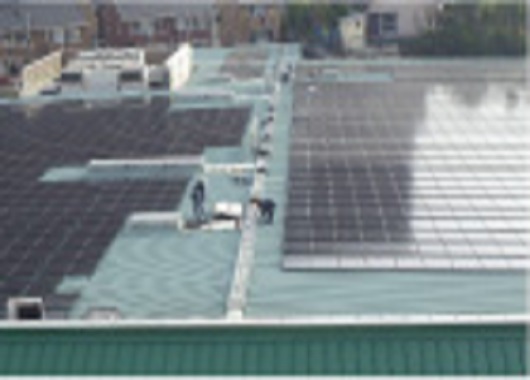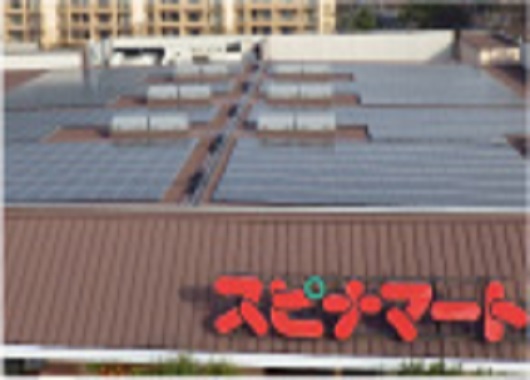In introducing new vehicles, we have introduced vehicles that comply with the latest exhaust gas regulations and are low-pollution vehicles that emit almost no nitrogen oxides, particulate matter, and other harmful substances. In addition, electric buses are being introduced to reduce CO2 emissions.
Idling stop system
We have been promoting idling-stop systems to save fuel and reduce exhaust emissions, but we had a problem in that air conditioning was not available when the vehicles were stopped. Vehicles introduced in 2009 and later are equipped with a device that allows cooling airflow during idling-stop (automatic idling-stop system). As of the end of FY2024, 1,319 units have been installed, with plans for further expansion.
Hybrid buses
We have introduced hybrid buses that combine a diesel engine and an electric motor to utilize energy stored during deceleration for heavy-load starting and acceleration. With the cooperation of the national government and related local governments, we began introducing these vehicles in FY2008, and 20 vehicles are in operation as of the end of FY2024.
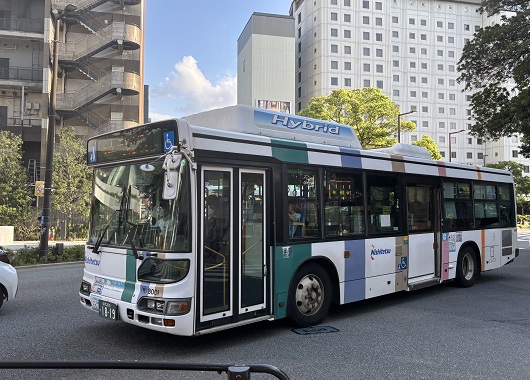
As part of efforts to become carbon-neutral by 2050, the Bus Business Division is expanding the introduction of electric buses.
In February 2020, one electric bus, converted from a diesel vehicle, was introduced at the Island City Sales Office. In October 2021, a modified electric bus provided by Sumitomo Corporation was additionally introduced to the sales office, and a verification experiment on energy management for the entire sales office was conducted using two electric buses, utilizing a large-capacity charge/discharge unit developed by Kyushu Electric Power Co., Inc. As a result, it was confirmed that the utilization of two electric buses can contribute to shifting electricity peaks.
Electric buses not only reduce CO2 emissions by approximately 50% compared to diesel buses, but are also expected to be used as emergency power sources in times of disaster.
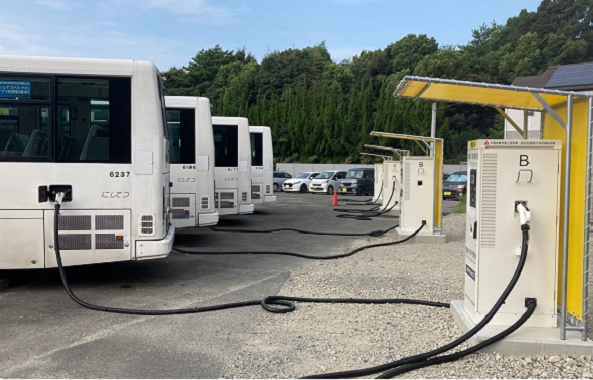

Retrofitted electric buses
In June 2024, we introduced the first prototype of the “Retrofitted Electric Bus,” an electrified version of an existing diesel bus 13 to 15 years old that we have been developing since FY2020, and by the end of FY2024, we introduced a total of 51 buses to routes in Fukuoka City and Kitakyushu City.
There are many examples of converted electric buses in Japan, but this is a rare example of converting a used bus to electric power.
The fuel efficiency of general-route buses in FY2024 was 2.0% higher than in 2004, before the introduction of digital tachographs, due to careful environmentally friendly driving.
Operation management by digital tachographs
A digital tachograph is used to record detailed information such as running speed, engine RPM, and distance traveled during operation for analysis and evaluation. In this context, we are making efforts in operation management to maximize the effects of improvements in fuel efficiency, such as evaluating not only the number of times idling stops are performed but also the quality of whether they are performed for a certain time or longer.
Environmentally friendly driving commendation system
Since 2009, we have been giving out “Eco-driving Awards” to crew members who have made diligent efforts to drive in an environmentally friendly manner. In FY2024, 58 crew members received awards, helping to raise each individual's awareness of environmentally friendly driving.
Solar panels have been installed at bus stops since August 2012. As of the end of FY2024, we have installed these at 23 locations, and all electricity generated is used to illuminate bus stops (destination signs) in an effort to save electricity.
In recognition of the improvement of fuel efficiency and reduction of greenhouse gases through the promotion of environmentally friendly driving, the company received the “Fukuoka Prefecture Governor's Commendation for Achievement in Promoting the Formation of a Recycling-Oriented Society” in fiscal 2017. The entire Automotive Business Division has been continuously working on activities to reduce environmental impact since 2004, and this recognition is a testament to the success of these efforts.
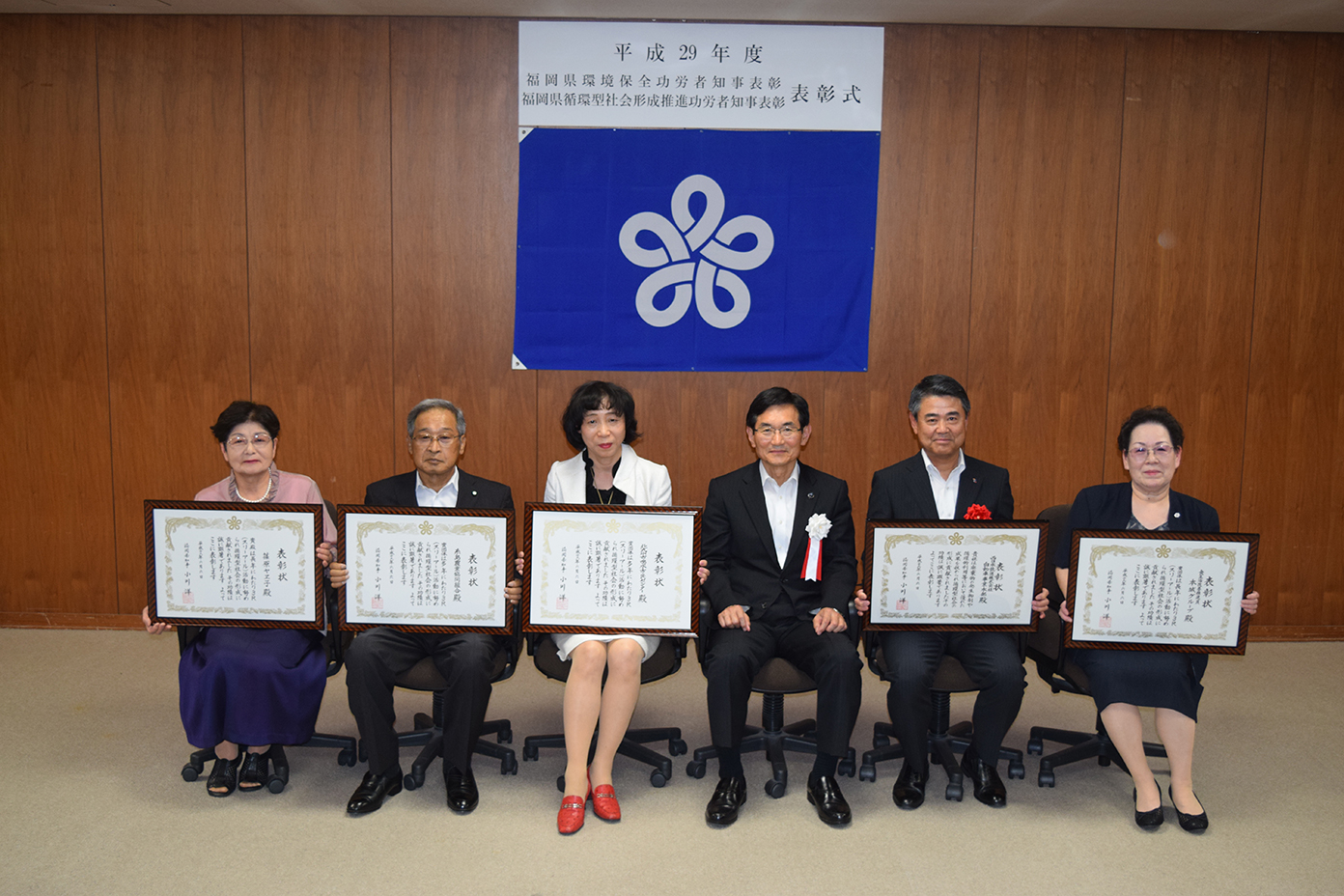
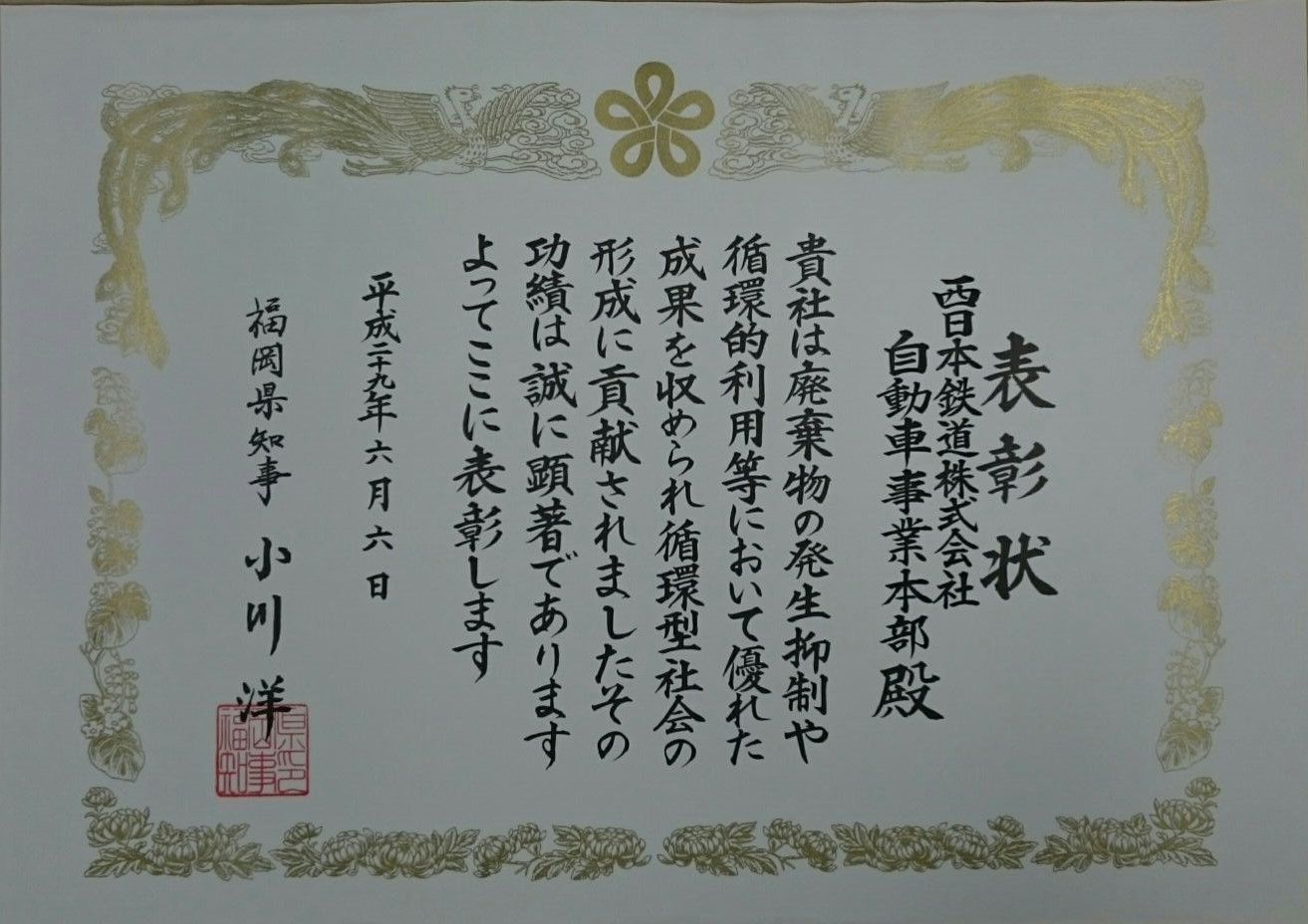
In the FY2019 Eco-Friendly Business Office Awards (results of FY2018 initiatives), the Katae Sales Office received the top prize in the ”Other Earth-Friendly Activities” category. This was in recognition of their efforts to significantly reduce CO2 emissions by introducing fuel-efficient buses, promoting park-and-ride programs, holding special classes on environmental themes in local communities, and implementing environmentally friendly driving during bus operations.
Fukuoka Komatsu Forklift Corporation is working to expand sales of large forklifts that meet 2014 standards for emissions from specified special motor vehicles and that combine environmental performance with low fuel consumption and workability, and high-performance electric forklifts with excellent water and dust resistance, based on Komatsu's proprietary technologies.
We will continue our efforts to reduce environmental impact by expanding sales of forklifts with superior environmental performance and promoting energy conservation and CO2 reduction at our customers' sites.
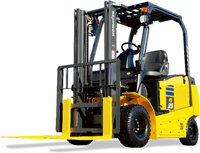
The “nimoca” transportation system IC card issued by nimoca CO., LTD has been adopted as the official IC card of Saga Prefecture government employees when traveling, effective January 31, 2025. This initiative aims to reduce CO2 emissions by introducing official IC cards to encourage prefectural employees to use public transportation when traveling, thereby eliminating the need for official cars. In conjunction with the introduction, nimoca CO., LTD is providing support for the introduction of the public IC card as well as advice on its use. We will continue contributing to the reduction of environmental burdens through our efforts to support Saga Prefecture government employees as they shift away from government vehicles.
On the Tenjin-Omuta Line, we are promoting the introduction of new types of rolling stock (VVVF cars) equipped with VVVF inverter controllers with excellent power efficiency and power-regenerative brakes that return power generated during braking to the power-supply side, in an effort to reduce power consumption during operation. For incidental power, we are promoting energy-saving measures such as the use of LEDs for lighting in stations, traffic signals, and railroad-crossing warning lights.
As for the Tenjin-Omuta Line, the introduction of new types of rolling stock is progressing, and at the end of March 2025, VVVF cars will have accounted for 60% of the total fleet with 168 cars out of a total of 282 cars, and electricity consumption is on a downward trend.
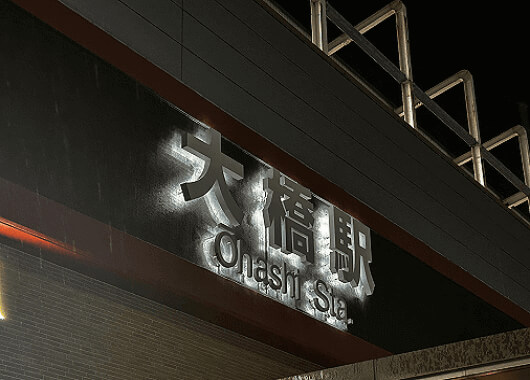
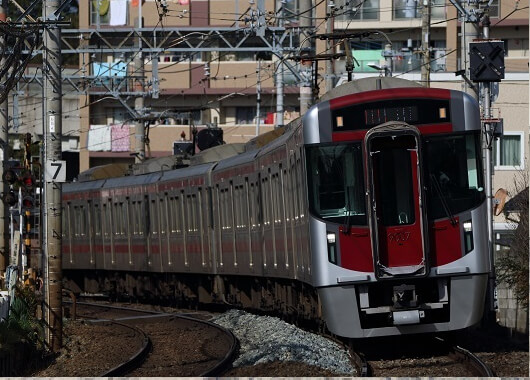
Chikuho Electric Railroad Co., Ltd. has introduced four new low-floor LRV5000 trains with VVVF inverter controllers that provide excellent power efficiency, power-regenerative brakes that return power generated during braking to the power-supply side, and LED lighting inside the trains, in an effort to reduce power consumption during operation.
As for incidental power, we have completed the conversion of all station buildings, railroad crossings, signals, and interior lighting to LEDs. Energy-saving lighting in building facilities has been and will continue to be phased in.
Energy-saving activities
The Vehicle Maintenance Section is working to reduce electricity, water, paper, heavy oil, and kerosene consumption by turning off lights during lunch breaks, adjusting air conditioner temperatures, installing water-saving panels, using circulars and e-mails, adjusting boiler operating hours, and reviewing the car-washing process.
Reuse of copier paper backing
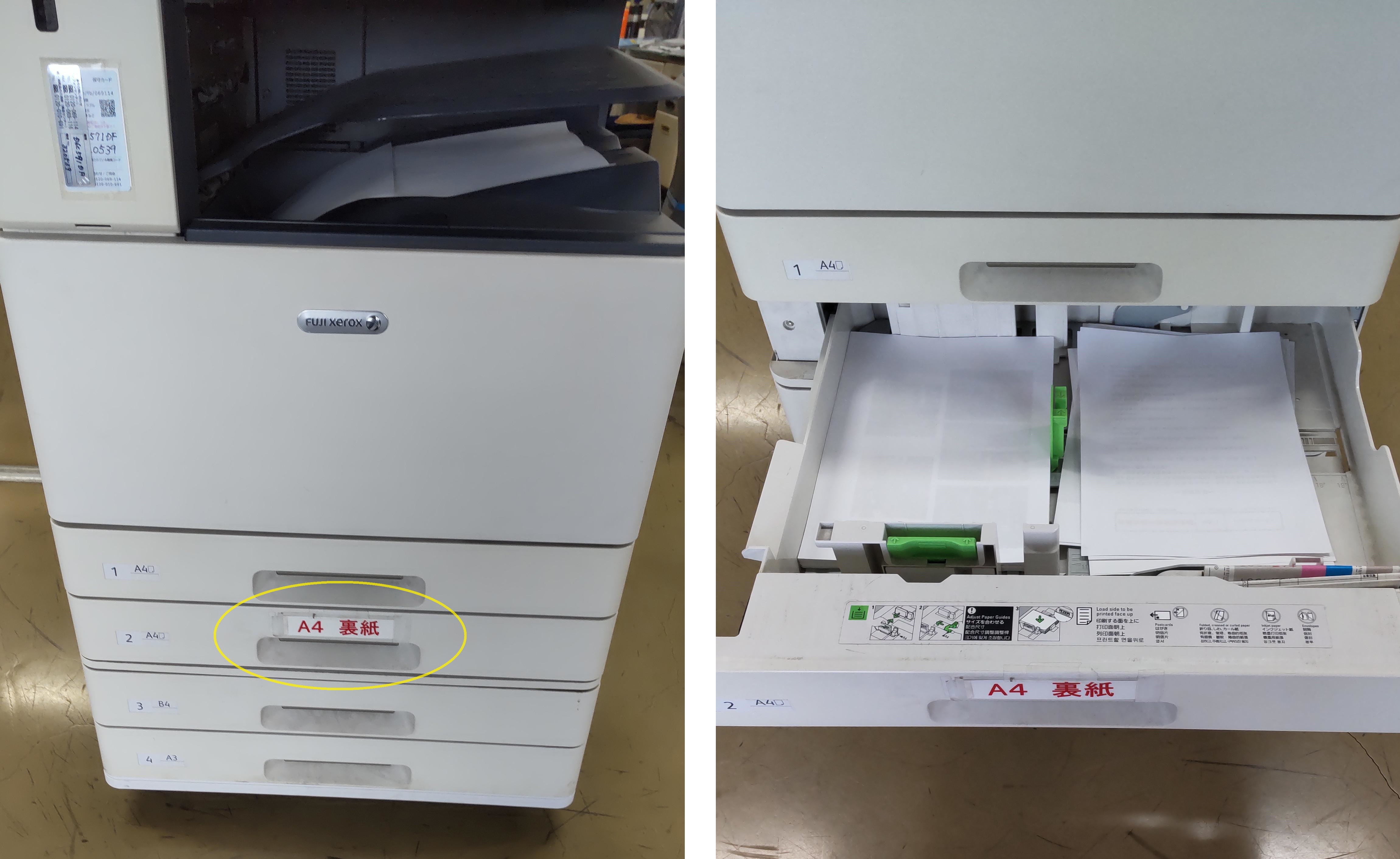
Switching to LED for indoor lighting
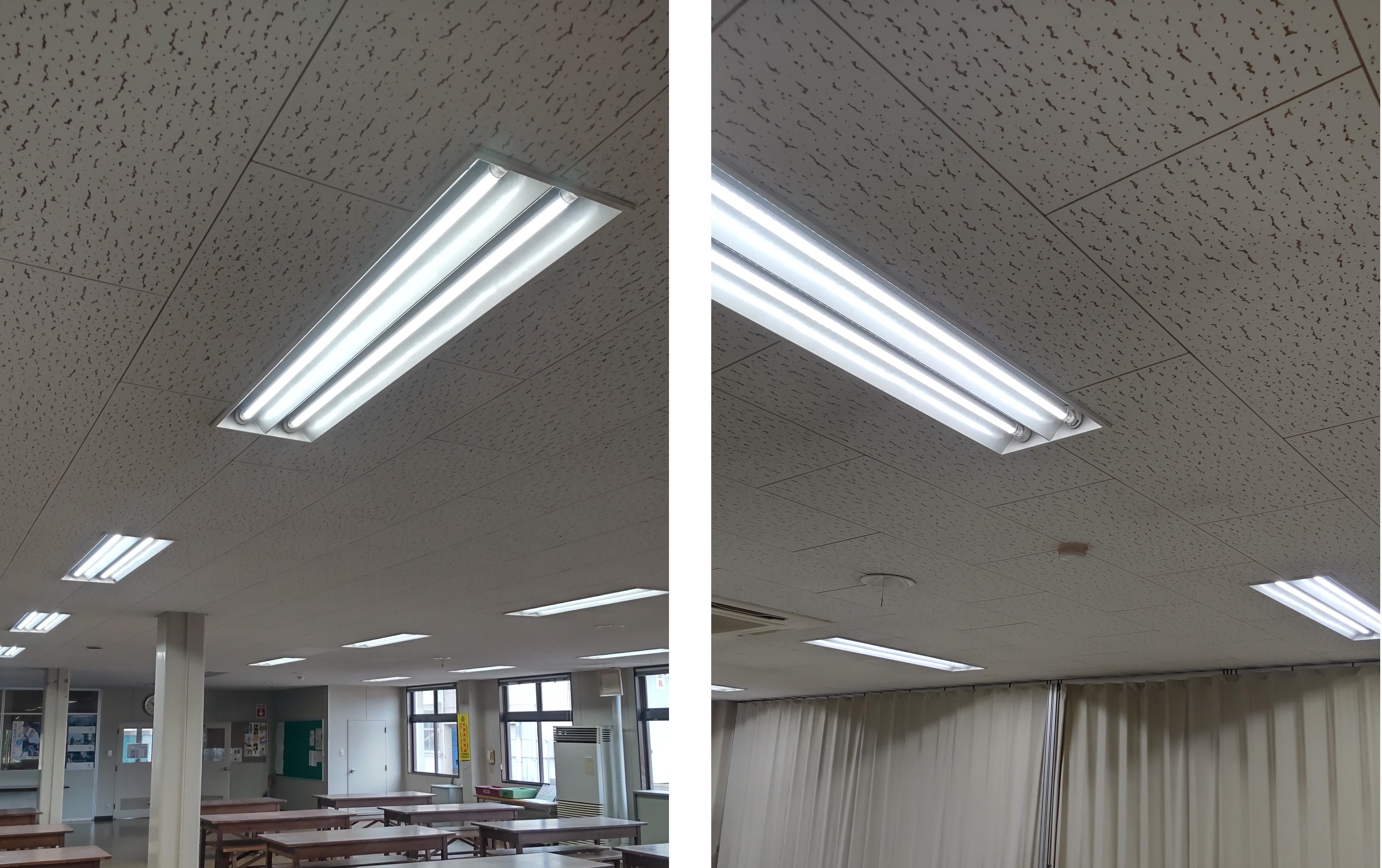
ONE FUKUOKA BLDG. has been installed with highly efficient lighting and air conditioning systems as well as improved thermal insulation with double skins and solar tracking blinds to save energy in the building. In November 2022, the building received the highest BELS*1 rating of five stars in an environmental performance evaluation. Its office area was certified as “ZEB Ready,”*2 and the entire building as “ZEB Oriented.”*3 We will continue contributing to the achievement of an environmentally sustainable society.
*1. BELS: Building-Housing Energy-efficiency Labeling System. This labeling system for the energy-saving performance of building sections was launched in 2014 by the Association for Evaluating and Labeling Housing Performance.
*2. ZEB Ready: Refers to an advanced building with a high-performance envelope and highly efficient energy-saving equipment, with a focus on becoming a Zero-Energy Building (ZEB).
*3. ZEB Oriented: Buildings that, in addition to the high performance of the building envelope and highly efficiency energy-saving equipment, have taken measures to achieve further energy savings and are designed to be ZEB Ready.
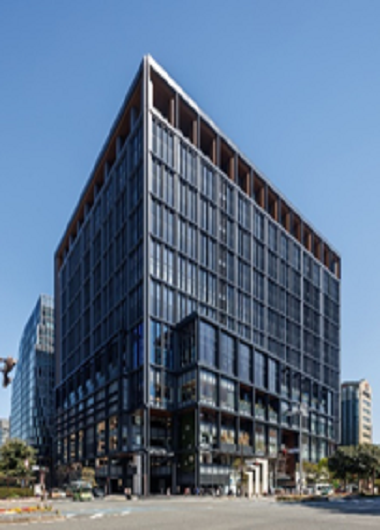
ONE FUKUOKA HOTEL is committed to the following initiatives.
Guests staying for consecutive nights are asked if their rooms will require cleaning. In addition, plastic amenities have been reduced, and wooden or bamboo items are provided.

Nishitetsu Wellness Co., Ltd. is promoting LED upgrades at its facilities, and in FY2023, it replaced mercury vapor lamps with LED lighting inside the Nishijin Palace Dome.
In addition, multiple trash cans are installed at the head office to ensure thorough separation of trash.
We will continue our efforts to promote the installation of LED lighting in smaller areas and work toward reducing our environmental impact.
INCUBE Nishitetsu Co., Ltd. has been promoting the use of LED lighting fixtures in each of its stores since FY2014. In FY2024, one new store was equipped with LED, and one store was upgraded to LED lighting as part of renovation work. As of June 2025, LED upgrades have been completed at 16 stores.
In the future, stores that have not yet been converted to LED will also be updated in conjunction with renovation work to save energy and reduce CO2 emissions.
By the end of FY2024, we replaced the lighting inside refrigerated display cases with LED lighting at 55 stores, resulting in a reduction o1,385,441 kWh (equivalent to 578 tons of CO2).
Additionally, we have implemented an energy visibility system (Enudge) at 51 supermarket locations to monitor electricity consumption and manage demand, promoting energy conservation. We will continue these efforts moving forward.
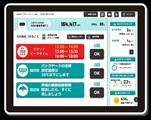
Electricity usage visibility system (Enudge)
Nishitetsu Hotels Co., Ltd., has introduced CO2-free, renewable energy electricity across all 18 of its domestic hotels starting in April 2025 by utilizing FIT non-fossil certificates and taking other measures. This greening initiative will reduce CO2 emissions by approximately 12,900 tons per year, which is equivalent to the emissions of about 7,500 households.*
Our hotel group will continue to expand its green initiatives.
*Calculated based on annual CO2 emissions of 1.72 tons (t-CO2) per household for electricity consumption.
The Nishitetsu Hotel Group asks guests staying multiple nights to cooperate with environmentally friendly cleaning services. With the understanding of our guests, we provide room cleaning service every other day during their stay to reduce wastewater and detergent use from washing linens such as bed sheets and nightwear.
The Global Logistics Division is working with customers to build a sustainable logistics system by reducing the environmental impact in the logistics field and improving logistics productivity.
Response to modal shift
We propose to change from truck to rail transportation for domestic transportation, especially for long-distance transportation. Rail transportation is expected to have the effect of reducing CO2 emissions to less than one-eleventh that of transportation by truck over the same distance. (*1)
We have also begun to handle bonded freight forwarding of cargo from Osaka to Tokyo by rail. (*2)
Assume trucking is between the nearest freight station and the pickup/delivery destination.
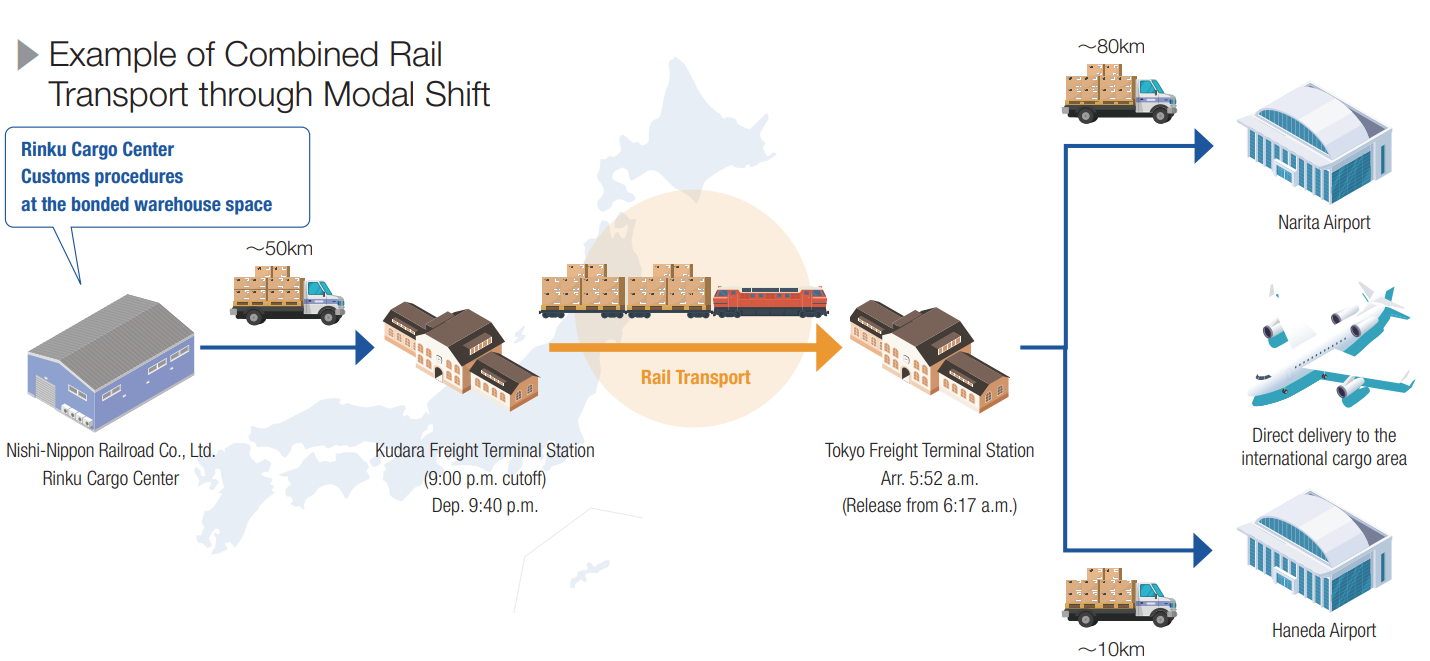
*1 Ministry of Land, Infrastructure, Transport and Tourism website, “Freight Rail Transport from an Environmental Perspective.”
https://www.mlit.go.jp/tetudo/tetudo_tk2_000016.html
*2 Japan External Trade Organization (JETRO) website “Bulk approval of bonded carriage from customs: Japan”
https://www.jetro.go.jp/world/qa/04A-020119.html
Support for Container Round Use (CRU)
Container Round Use (CRU) refers to the continued use of empty containers for export loading after unloading import containers. This eliminates the need to transport empty containers back to the port. We promote the practice of Container Round Use (CRU) in cooperation with customers and shipping companies.
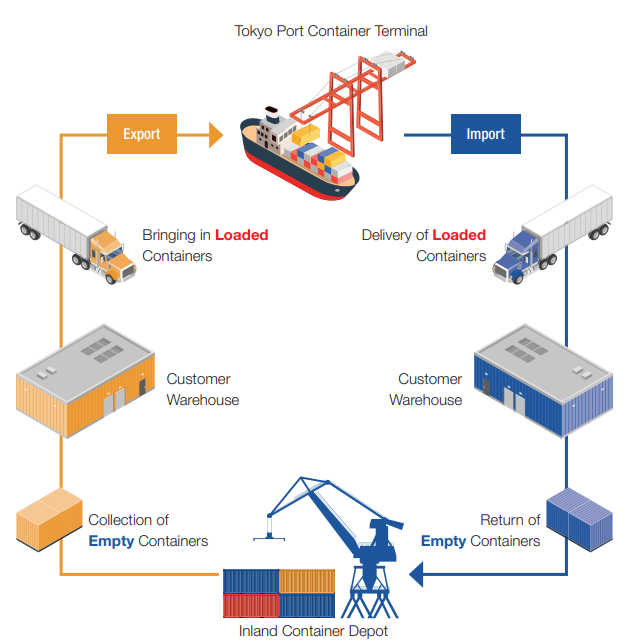
Nishitetsu Logistics Co., Ltd. promotes the use of fuel-efficient tires (eco-friendly tires), which are said to reduce CO2 emissions by reducing fuel consumption relative to the distance traveled.
To support the environmental protection initiatives promoted by local governments and truck associations, and with their cooperation, we are introducing eco-friendly tires in conjunction with vehicle inspections and other timings.
FY2024 introduction results: Introduced in 32 of the total 42 units.
| Chikushi Solar Power Plant | Wakiyama Solar Power Plant | Tagawa Ita Solar Power Plant | |
| Form of installation | Roof-mounted | Flat type | Flat type |
| Power generation equipment | Solar panels: 2,296 | Solar panels: 2,072 | Solar panels: 2,912 |
| Generation capacity | 500 kW | 500 kW | 600 kW |
| Start of operation | July 26, 2013 | January 29, 2014 | January 29, 2015 |
| Anual | Approx. 629 MWh/year | Approx. 536 MWh/year | Approx. 852 MWh/year |
| power generation | (Approx. 126 residential equivalent units) | (Approx. 107 residential equivalent units) | (Approximately 170 residential equivalent units) |
*Average annual electricity consumption per residence: 5,000 kWh/year (based on data from the Household Budget Survey, Statistics Bureau, Ministry of Internal Affairs and Communications)

Chikushi

Wakiyama
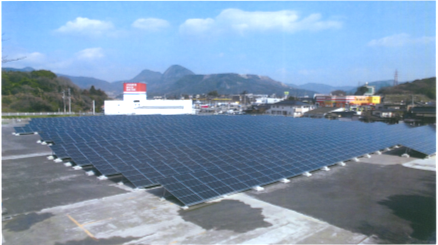
Tagawa Ita
Through on-site solar PPA projects, we are working to further promote decarbonization and enhance disaster resilience by utilizing renewable energy, such as solar power. Additionally, we are actively collaborating on regional development initiatives centered around renewable energy.
1) Signed an on-site PPA with Nogata City and began supplying electricity to the Nogata City Sludge Recycling Center.
2) Launched the first on-site PPA project within the Nishitetsu Group at the Hakata International Exhibition Hall & Conference Center.
3) Started an on-site PPA project for the new Maruha Nichiro Ishinomaki Factory.
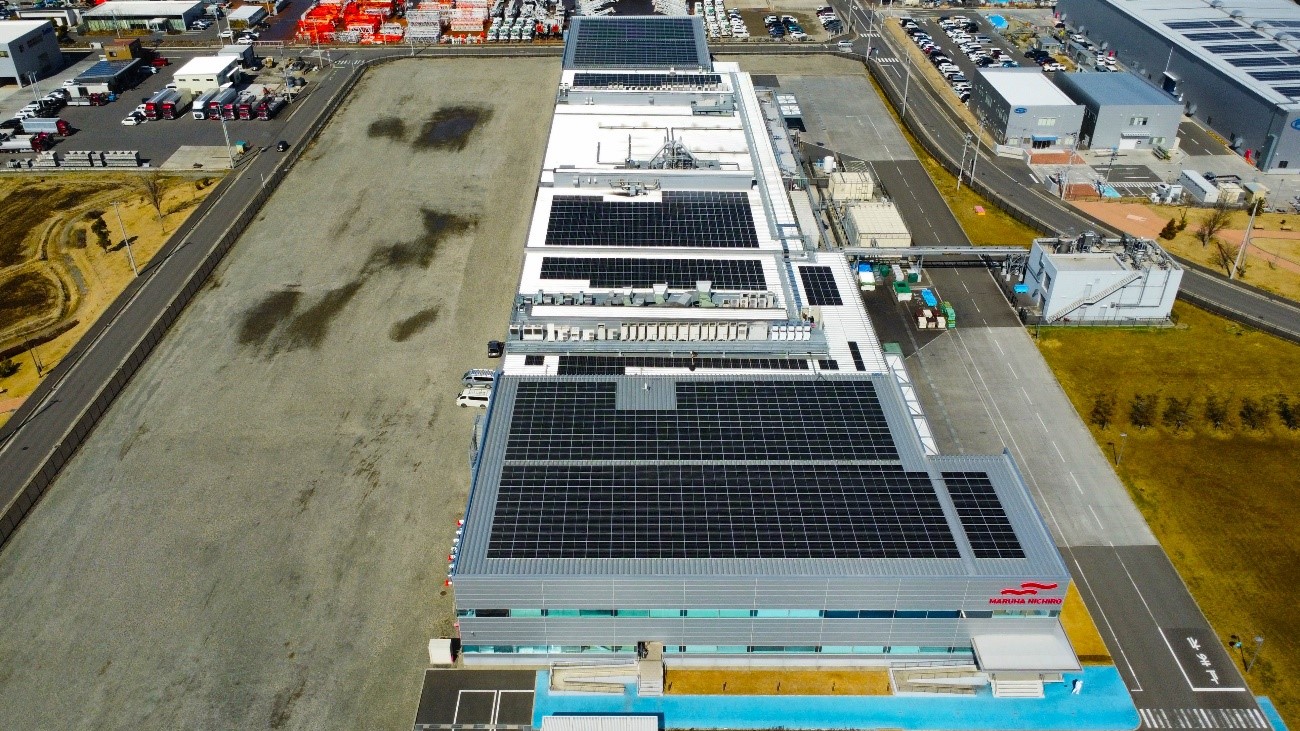
Maruha Nichiro Ishinomaki Factory
Nishitetsu Shizen Energy has entered the grid storage battery business to provide balancing capacity for the increasing use of renewable energy. In June 2024, we began operations at our first storage battery facility, Nishitetsu Shizen Energy Battery Hub Umi and Nishitetsu Shizen Energy Battery Hub Iizuka. This facility has a storage capacity of 4.659 MWh (output: 1.92 MW), capable of maintaining the supply-demand balance for an amount of electricity equivalent to the daily consumption of approximately 400 households.
Through energy management initiatives utilizing storage batteries, we aim to contribute to the efficient use and stable supply of renewable energy, helping to realize a sustainable, decarbonized society.
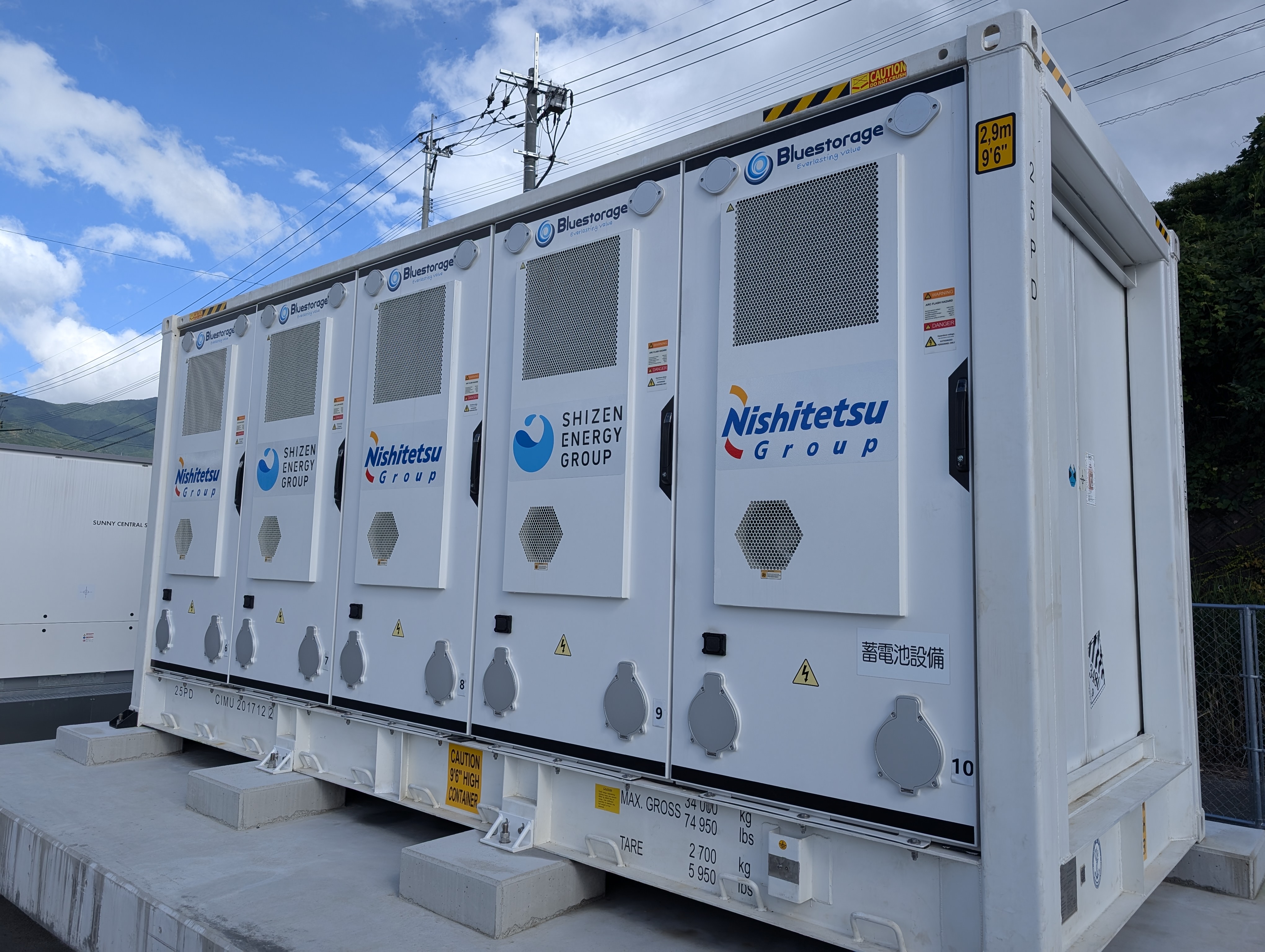
Battery Hub Umi
The Global Logistics Division launched solar power generation initiatives in fiscal 2024 to reduce environmental impact. The facilities equipped with solar power generation systems are the Rinku Logistics Center, Narita Logistics Center, and Kanto Logistics Center. With a total output of 567 kilowatts, it has a power generation capacity that reduces approximately 420,000 kilograms of CO2 annually.
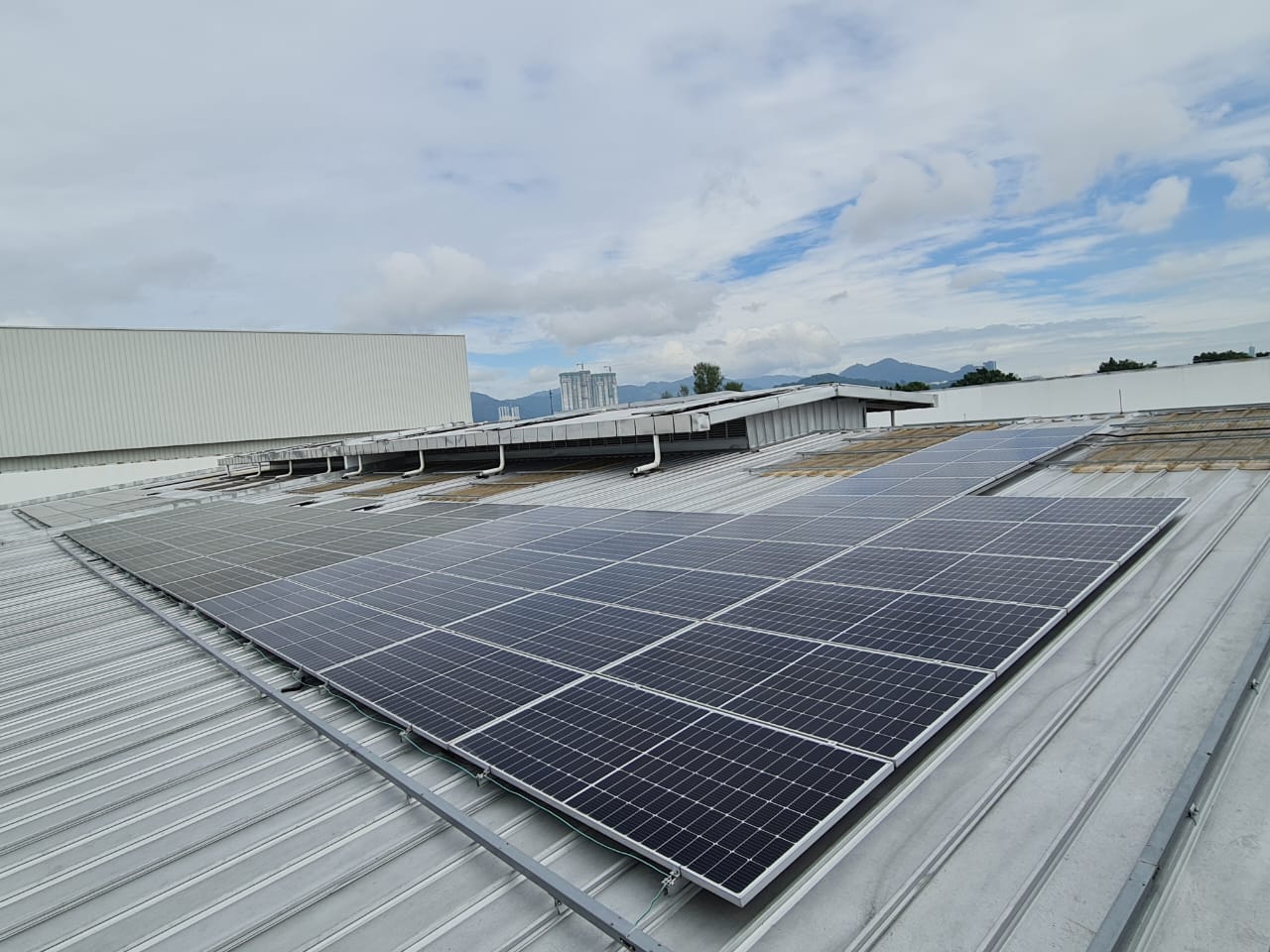
Solar panels at the Penang warehouse
As part of its decarbonization efforts, NNR Thailand installed solar panels at its Bangkok warehouse, commencing solar power generation in April 2024. Approximately 30% of the electricity used is now replaced with solar energy.
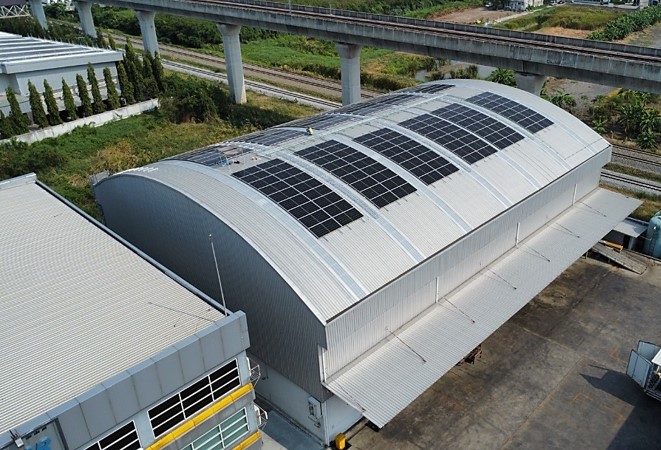
Solar panels at the Bangkok warehouse
Spina Co., Ltd. has entered the solar power generation business using the roofs of existing facilities, focusing on solar power as a renewable energy source from an environmentally conscious perspective. Three facilities in Kitakyushu are equipped with solar power generation systems: the Spina Mart Anoo, the Spina Lazolier Takami, and the Spina Garden Otemachi. With a total area of approximately 4,000 square meters, the system has a total output of 450 kW (kilowatts) and reduces CO2 emissions by approximately 135,000 kg per year.
Spina will meet future demand for electric power through its solar power sales business and, as a member of the local community, will promote decarbonization and energy-saving activities to contribute to the reduction of environmental impact.
Solar power generation business of Nishitetsu Store Inc.
Nishitetsu Store's Uncle Yume Ichiba Amagi store has been operating a solar power generation business since January 2014. Solar panels (solar power generation equipment) have been installed at the store, which generated approximately 92,000 kWh in FY2024.
Additionally, we have installed solar power systems at stores through PPA projects, completing installations at five locations—Reganet Nakama, Reganet Fukutsu, Reganet Togo, the Mizuma Store and the Kashiikaen Store—by the end of FY2024.
As a member of the local community, we will continue to promote initiatives that take the global environment into consideration and strive for low carbon and energy savings.
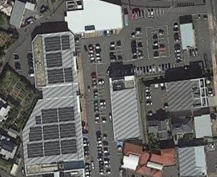
Solar power system at Reganet Fukutsu
